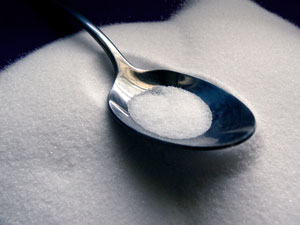we delivers enough to blog about

Can artificial sweeteners make you fat?
By Nick Hall
Aspartame is an artificial sweetener that was first discovered in 1965. Aspartame is sold under the brand Equal or Nutra-Sweet. It’s used as a substitute for sugar and has been widely approved around the world. Aspartame is also one of the most scientifically tested compounds ever, although the validity of some of the scientific testing on Aspartame has been questioned.
Aspartame or other artificial sweeteners can be found in diet soft drinks, protein drinks, chewing gum, diet lollies, anything labelled sugar free, low fat yoghurt, ice cream and other low fat or low sugar desserts or condiments such as sauces, fruit spreads, jam and jellies.
Whilst concerns still remain about the safety of Aspartame, this article will focus on its effect on weight loss. There is a belief that artificial sweeteners can assist with weight loss and can also be helpful for individuals with diabetes as it contains zero calories and does not spike blood sugar levels.
Artificial sweeteners have however been linked to increases in appetite for sweet foods and also increases in insulin secretion.
A recent 12 week study was conducted by researchers in Brazil into the effects that artificial sweeteners had on the appetite of rats. The rats were broken into three groups. The rats across all three groups all were fed plain yoghurt plus their regular rat food. One of the groups had their yoghurt sweetened with Aspartame, another with Saccharin (another artificial sweetener) and the third group with regular sugar.
After 12 weeks, the rats which were fed yoghurt sweetened with either Aspartame or Saccharin gained weight compared to the rats which were fed yoghurt sweetened with sugar; however the total calorie intake across all three groups was similar. The rats all consumed a similar calorie intake as the rats which were fed artificially sweetened yoghurt had larger appetites and consumed extra rat food.
A similar response has also been show in a study conducted by Swithers and Davidson which found that rats which were fed artificial sweetener increased the amount of calories they consumed which then lead to an increase in body weight, body fat and reduced thermic response to sweet tasting foods.
These results indicate that when artificial sweeteners are introduced into a diet, physiological processes that control appetite and energy expenditure are interfered with. Sweet taste, regardless of calorie content enhances your appetite. When you consume a naturally sweet food, your body receives the calories from that food. When the sweetness is from an artificial source, your body doesn’t receive the extra calories it is expecting resulting in an unsatisfied appetite.
Artificial sweeteners can also interfere with insulin and leptin function. Insulin and leptin are primary regulators of your metabolism, fat storage and appetite. Phenylalanine and aspartic acid make up 90 percent of aspartame. High amounts of insulin and leptin secretion can lead to insulin and leptin resistance which can then result in weight gain and obesity.
Phenylalanine can also lower serotonin levels which can reduce your level of satiety. This can then lead to over eating.
Artificial sweeteners are not always listed on ingredients labels under their real name. They are often coded for example sweetener 950 (Acesulphame K), 951 (Aspartame), 952 (Cyclamate), 954 (Saccharin), 955 (Sucralose), 956 (Alitame) and 961 (Neotame).
I previously would use artificial sweetener in coffee as a substitute for sugar and also consume sugar free soft drink instead of the sugar containing variety. Strangely enough, soon after I removed artificial sweetener from coffee, my cravings for sugar free soft drink disappeared.
Whilst artificial sweeteners contain zero calories, the evidence suggests that they can lead to weight gain. A better option can be to choose a natural low calorie sweetener such as Stevia or Xylitol.
References:
Swithers S and Davidson T. A role for sweet taste: calorie predictive relations in energy regulation by rats. Behavioural Neurosciences, 2008.
Davidson T, Martin A, Clark K, Swithers S. Intake of high-intensity sweeteners alters the ability of sweet taste to signal caloric consequences: implications for the learned control of energy and body weight regulation.
Mercola, Dr J. Artificial Sweeteners Cause Greater Weight Gain than Sugar, Yet Another Study Reveals. Mercola.com, December 2012.